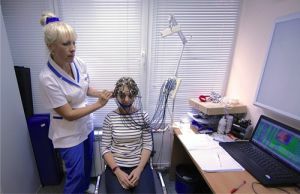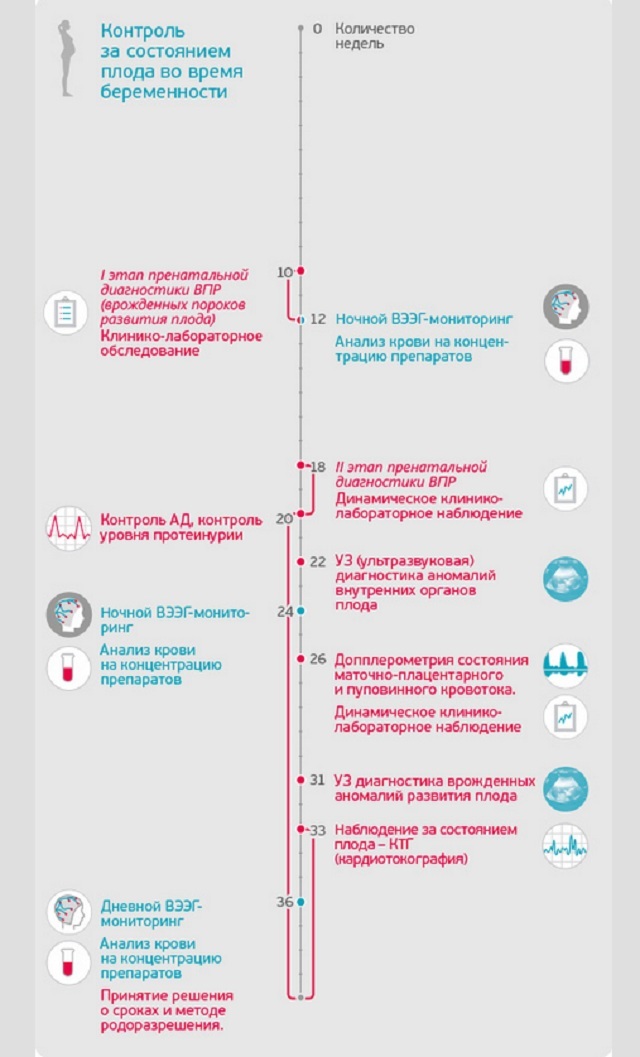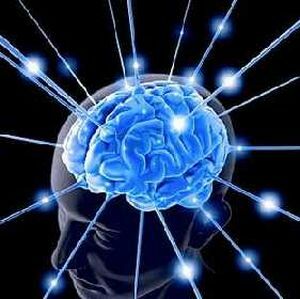 Epilepsy is a neurological disease, a brain disorder in which epileptic seizures occur repeatedly.
Epilepsy is a neurological disease, a brain disorder in which epileptic seizures occur repeatedly.
Some seizures occur due to structural damage to the central nervous system and, conversely, in some cases, there is no such damage or the pathogen can not be recognized.
The attack can comprehend a person at any time, that is, both during the day and at night during sleep, but the disease in an easier form of the person does not limit, it can live quite normally - to play sports, work, have fun, havefamily.
Many people are interested in the question of whether it is possible to have a healthy baby if. ..
. .. the mother of
is sick Today a woman with epilepsy can get pregnant and successfully pass through the entire pregnancy under the supervision of a neurologist. She should inform the doctor about her desire to become pregnant 6-12 months before the planned conception of the child, in view of the need to adjust the treatment so that to take only one antiepileptic drug in the minimum possible dose.
If a woman is already pregnant while taking antiepileptic drugs, the fetus may be at risk, mainly in the 1st trimester of pregnancy, namely 3-8 weeks after conception, even before many women find out about their pregnancy.
If the situation permits, the neurologist may advise a woman during pregnancy to completely exclude taking medications( an important condition for this is the absence of seizures within 2 years and the consent of the woman herself).Treatment, however, should always be adjusted before pregnancy. Along with the change in treatment, a woman should take folic acid. 
Apparently, epilepsy does not mean for a woman a refusal of pregnancy. The question arises, what is the risk that the mother's illness will affect the health of the child. Pregnancy and childcare for a woman with epilepsy can be problematic, especially when taking higher doses of the drug or a combination of these. Antiepileptic drugs can also affect the development of the fetus.
That's why before planning maternity you need to consult a neurologist. Women with epilepsy carry in comparison with healthy women in 2-2,5 times greater risk of fetus.
Therefore, future mothers with this disease are recommended to consult a specialist gynecologist who has experience with epilepsy.
Pregnant woman's management
Before a planned pregnancy, a neurologist who cares about a woman with epilepsy should find out a few key questions.
 The diagnosis of a woman is sure or has a high degree of probability. Seizures that occur during pregnancy can lead to birth defects or complications during pregnancy?
The diagnosis of a woman is sure or has a high degree of probability. Seizures that occur during pregnancy can lead to birth defects or complications during pregnancy?
Before pregnancy, you need to determine what type of epilepsy a woman suffers. Before pregnancy, it is necessary to carry out the necessary neurological examinations, EEG( electroencephalogram), MRI( magnetic resonance imaging), study of drug concentration( antiepileptic drugs) in the blood for inpatient treatment.
Find out if treatment is required with antiepileptic drugs( drugs that reduce the frequency and intensity or completely prevent seizures).
Women who have not had epileptic seizures for more than 2 years should consider taking antiepileptic drugs from the therapy complex( this is very individual).
At present, it is known that only one drug( monotherapy) brings the least risk, which best suppresses seizures in this patient.
The dose of the drug should be minimal, but sufficient to adequately suppress the seizures.
The adverse effects of drugs and the risk of seizures( especially generalized, ie, in the absence of consciousness, severe convulsions of the body, impaired breathing and oxygenation of the blood) should be weighed.
PEP reception should be distributed for 24 hours so that their level in the blood fluctuates at a minimum.

Also note the following:
- as epilepsy can affect pregnancy, childbirth and the postpartum period;
- the possibility of monitoring the development of the fetus in the first months of pregnancy;
- as will undergo regular monitoring during pregnancy.
Additionally, genetic testing is performed, including the elimination of other potential risks( antibodies against certain viral diseases, testing for thrombophilia mutations, folate levels, B6, B12 and homocysteine vitamins).
At least 3 months before the planned pregnancy, folic acid should be administered at a dose of 5 mg / day and B vitamins. In the USA, for example, it is recommended to take selenium 0.2 mg / day( protection against harmful effects of antiepileptic drugs ondeveloping fetus).
During pregnancy it is necessary:
- Continue treatment with antiepileptic drugs ( the neurologist can be guided by testing their blood levels and EEG when adjusting the dose).Strong attacks carry the same risk of congenital defects, miscarriages, premature death of the fetus and other complications, as well as anticonvulsant treatment. Patients should not exclude medication without consulting a neurologist.
- Continue taking folic acid, vitamins .In some antiepileptic drugs administered a month before birth, even vitamin K( Kanavit - 10 drops / day) is present.
- Perform regular checkups during pregnancy .
Choose the lesser of
ashes Antiepileptic drugs for today can be divided into 3 groups. PEPs of the 1st and 2nd groups include: Phenobarbital,  Primidone, Phenytoin, Valproate and Carbamazepine. Exposure to valproate and carbamazepine increases the risk of neural tube defects and orofacial area.
Primidone, Phenytoin, Valproate and Carbamazepine. Exposure to valproate and carbamazepine increases the risk of neural tube defects and orofacial area.
Less serious congenital malformations of the fetus are morphological defects that do not affect the quality of life of a person. They include deviations from the normal appearance - microcephaly, epicanthus, low set ears, uneven teeth, nose, mouth, underdevelopment of fingers, short neck, etc.
In children of mothers who take PEP, these deviations occur in 2 times more often than in mothers who do not take them.
Teratogenic potential of 3rd group PEP - lamotrigine, vigabatrin, gabapentin, topiramate, levetiracetam - is not yet clear.
However,  is considered that antiepileptic drugs of the 3rd group are safer than those of the 1st and 2nd groups.
is considered that antiepileptic drugs of the 3rd group are safer than those of the 1st and 2nd groups.
The greatest number of pregnant women were observed with monotherapy with lamotrigine. Studies have shown a minimum of congenital defects of the fetus.
Lamotrigine, therefore, is recommended as an optimal remedy for the treatment of epilepsy in pregnant women and those who are about to become pregnant.
We're giving birth!
Features of epilepsy:
- The risk of a large onset during labor is relatively low( about 1%).It can be stopped by introducing Diazepam into a vein.
- Neurologists recommend a cesarean section only for women at increased risk of serious seizures or such that
 could affect their collaboration during childbirth. Most women with epilepsy can give birth naturally.
could affect their collaboration during childbirth. Most women with epilepsy can give birth naturally. - Epidural analgesia for women with epilepsy is not contraindicated, on the contrary, it can significantly contribute to the smooth passage of labor.
- It is very important that a woman with epilepsy on the day of delivery does not miss regular medication.
- The presence of a husband can help a woman achieve psychological well-being and, at the same time, provide constant monitoring and control in the event of an epileptic fit during childbirth.
Epilepsy and breastfeeding
Breastfeeding is recommended because the fetus is exposed to high doses of antiepileptic drugs throughout its development in the womb to a much greater extent than "gets" in milk during lactation.
Thus, today, regardless of the type of antiepileptics used, breastfeeding is recommended for at least 4-6 months.
Asked - we answer
We asked the most popular questions about epilepsy to our neurologist and that's what he said:
- Epilepsy is a mental illness affecting the IQ .No. Epilepsy is not a mental illness. On the intellect, it affects only a very small part of the patients. This myth has its roots back in the Middle Ages.
- Is it always a hereditary disease of ?Not necessarily, although some addictions to epilepsy are inherited. But this disease can be acquired during life. It can result in a traumatic brain injury, a brain tumor, a stroke or
 , even meningitis.
, even meningitis. - Disease is curable ?Some types are curable or in themselves will eventually subside.
- A child with epilepsy at school can not attend physical education classes ?If he does not suffer from a severe form, characteristic daily bouts, then he can. In addition, it's good that he is not excluded from the team.
- A woman with epilepsy should not become pregnant with ?Not true. Some types of epilepsy can be transmitted to a child, but, in most cases, the baby is born completely healthy. In women suffering from epilepsy, there is a 2-fold greater risk of fetal damage than that of "healthy" women, but this amount is only about 8%.
Dear mothers with epilepsy, do not give up the desire to have a baby! If you want to be a mom, talk to your doctor about options and potential risks.



